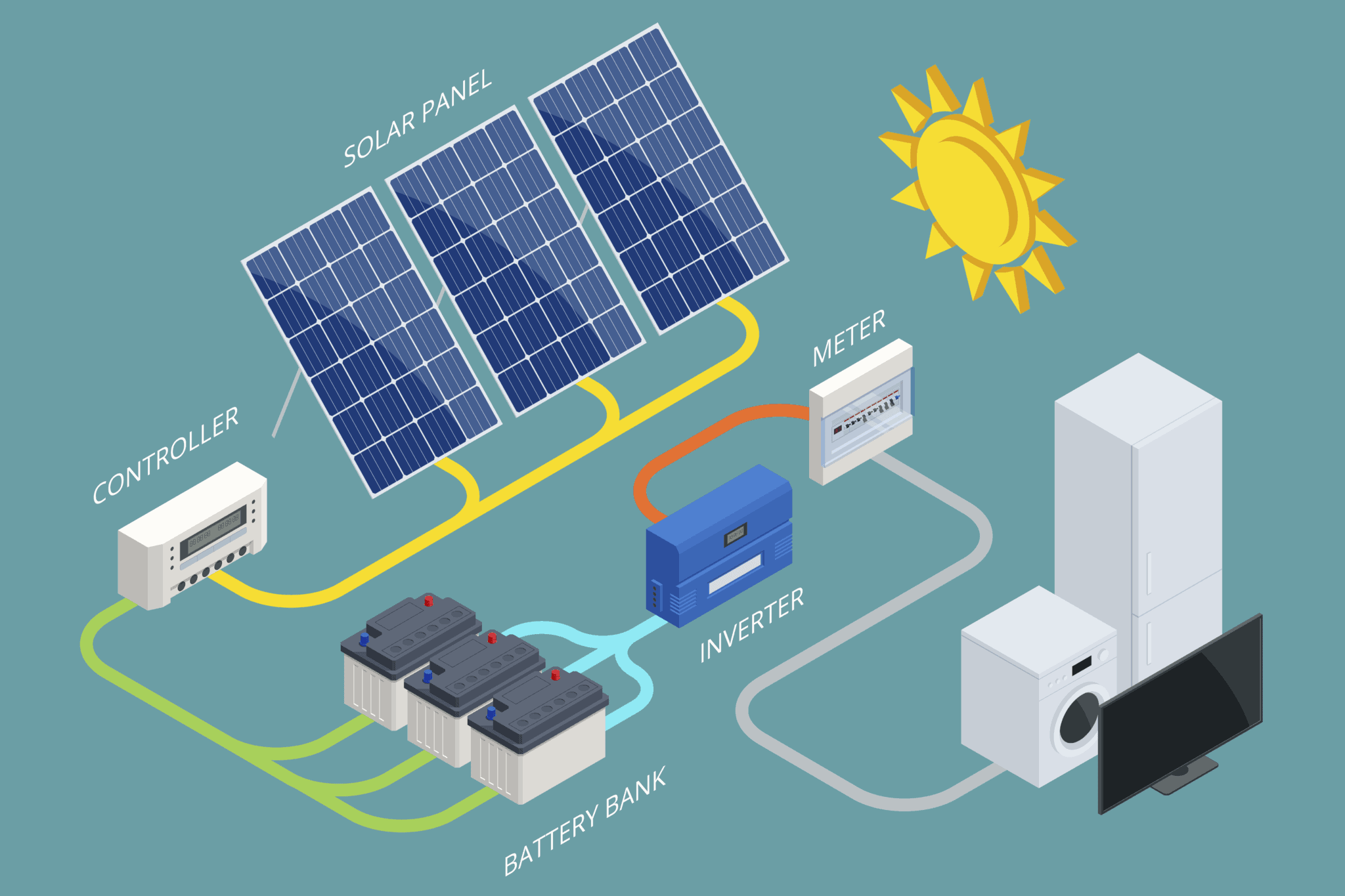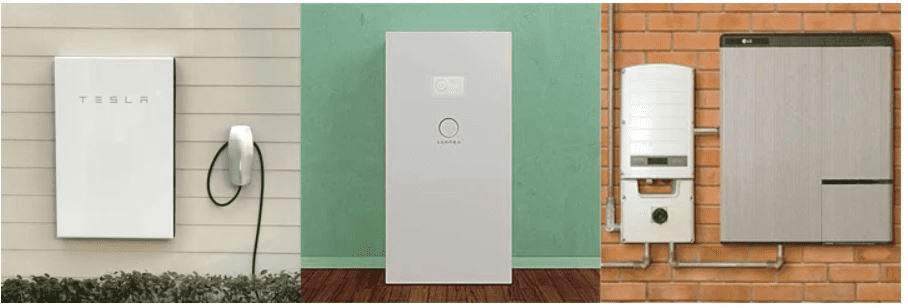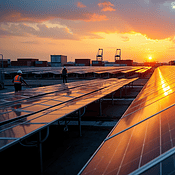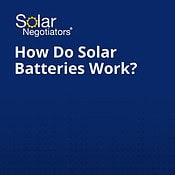
Solar Battery 101: Everything You Need to Know
Solar energy is great because it’s clean and affordable. Take it a step further by learning how to store your excess solar energy.
Solar Power, The Environmentally Friendly Power Option
Solar power has come a long way in the last several decades.
Before it used to be incredibly inefficient and expensive, but now solar panels have gotten so much better. In fact, people worldwide in homes big and small have started going solar because they’ve realized that they can spend less money on powering their homes while replacing renewable sources of energy with clean, green energy.
And while solar energy technology has improved so much, there’s still more we can do to improve our solar energy systems and the power that they produce.

How To Store Solar Energy
The great thing about solar energy is that it takes advantage of the sunlight that’s freely available outside. Capturing the sun’s light and turning that light into a clean and renewable source of energy is a win for everyone.
But there is one problem.
Most people work during the day. This means that during the majority of the day, the home sits empty. And since people spend most of their time at home during the evening, they still need to rely heavily on the grid to provide them with the electricity they need to run their appliances and electronics because the sun does not shine as abundantly in the evening when they’re home.
Luckily, solar power makes it easy to store that unused electricity during the day, so you can use more of that clean, renewable energy in the evening when you’re actually home.
In other words, using a solar battery is a great way to get the most out of your solar energy system when you’re actually home to use it.
How Do Solar Batteries Work

Batteries are pretty straightforward. They store electricity and hold onto their charge until their power stores are needed by an external source. In the case of a solar battery, the electricity is going to be used mostly by your house.
But solar energy is just one part of a larger strategy.
Think of your energy needs in terms of production, storage, and power.
Store Your Production
Your solar energy system helps convert the sun’s energy into usable energy. Your solar energy system first powers the immediate needs of your home. The size and shape of your roof will help determine how much solar energy your system can produce.
Solar Energy Storage
In most cases, your solar energy system should be able to produce more energy than you need at the moment. Which leaves you with excess energy. This is where the solar battery comes in. Your solar energy system can help you store that solar power so you can use it later when your system isn’t producing enough electricity. Most of the time, you’ll use that stored energy at night.
How Long Will a Solar Battery Last?
The length of your solar battery depends on the size of your battery. Battery capacity is measured in kWh ( or kilowatt-hours), this is the amount of total energy that the solar battery can store. Typically, solar batteries don’t use the entire battery capacity, they use what is called the usable capacity which is only 80 to 90% of the entire battery capacity. Only using 80 to 90% of the total battery capacity helps to preserve the battery and prevent the battery from shutting down due to not having enough energy.
The size of a solar battery that you need for your home will depend on the size of the solar system that you have installed. For smaller homes (and systems) you can expect to purchase a battery with around 2.5 – 5 kWh of energy storage. With a 5 kWh battery, you can run some lights, your fridge, and a TV for roughly 10 hours. For a larger home (and system) you should consider a battery that will hold 13 – 15 kWh of storage. With 15 kWh of stored electricity, you can expect to run lights, a fridge, and a TV for roughly 30 hours.
It’s always a good idea to talk with your solar provider about solar battery options and their life expectancy. Most of the time, you will need to replace your solar batteries before your solar panels need to be replaced. Since solar batteries last 5 to 15 years and solar panels typically last 25 years.
Are There Different Types of Solar Batteries?
Just like any product on the market (phones, laptops, televisions, etc.), there are different types of solar batteries that all perform in different ways and in different capacities.
There are four different types of solar batteries when it comes to residential systems:
- Flow Batteries
- Lithium Ion Batteries
- Lead Acid Batteries
- Nickel Based Batteries
Flow Batteries
A flow battery is one where the electricity flows between one or more tanks, through an electrochemical cell. When these tanks are charged, there is a chemical reaction that occurs so that energy can be stored and used as needed.
Flow batteries are nice because you can use 100% of their stored energy, without damaging the health of the battery. These batteries are low maintenance and have the longest life span of 30 years. However, the long life span and low maintenance of these batteries come with costs. Flow batteries tend to be the most expensive of the solar battery family.
Lithium Ion Batteries
In simplest terms, a lithium-ion battery stores chemical energy and then converts it into electrical energy that can be used to power your house. This happens through a chemical reaction.
With lithium-ion batteries, you don’t have to worry about too much maintenance. Like flow batteries, there is minimal, if not no maintenance. These batteries have a longer life, but not as long as flow batteries. You can expect to receive a guaranteed 10 years.
The setbacks with a lithium-ion battery are kind of big. Because of the chemical reactions and the chemistry of lithium-ion batteries, these tend to catch fire more often than the others, especially when installed incorrectly. When installed correctly the chance of it catching fire drops to 1%. These are also one of the more expensive when it comes to solar batteries.
Lead Acid Batteries
Lead acid batteries store energy through a chemical reaction that happens between lead, water, and sulfuric acid. Lead acid batteries have been used to store solar energy for years and years. They are the cheapest solar battery option, and because they have been used for so long they are the most reliable. On top of that, they are easy to get rid of.
Some of the setbacks to these batteries are that lead acid batteries require regular maintenance in order for them to stay in good working condition. When installed wrong, you risk the battery leaking and they need to be charged more often than the other batteries. These batteries have a shorter life than the other batteries discussed at 5 – 10 years.
Nickel-Based Batteries
Nickel-based batteries work a little differently than the batteries we have talked about previously. The chemical reaction from these batteries comes from the metal being rolled with cadmium and separator layers that are in redox.
These batteries require zero maintenance and can work in extreme temperatures. Because of this, they are extremely durable solar batteries. With that being said, they aren’t used as often as the other batteries. The biggest reason is that cadmium is very toxic. Because of this, getting rid of these batteries is so hard.
Use Your Stored Power
When you need the stored energy, it’s there to use. Maybe that’ll be on an overcast day when your system isn’t producing as much. Maybe it’ll be after fresh snow while there’s still some snowfall on your panels. But in all likelihood, it’ll be at night when the sun’s shining elsewhere and your system isn’t producing any electricity until the morning.
The great thing about this energy strategy is that it allows you to further distance yourself from the electricity grid. You can enjoy the benefits of affordable, clean solar energy both when you have an overabundance of it and when your system isn’t producing anything.

Should You Get A Solar Battery
Living in sunny California, you don’t need to worry about your solar panels collecting enough energy from the sun to power a solar battery. However, it would still be helpful to have your solar panels monitored to see if you could benefit from getting a solar battery.
A Solar Negotiators energy expert can help look at your system’s energy production levels and determine how much you could save by storing your energy in a solar battery to use later. They’ll help you understand the numbers so you can also see why getting a battery would be the right move for you.
Interested in reaching out to a Solar Negotiators energy expert? Click here.
Time To Go Solar! Get A Free Quote On A Solar Battery From Solar Negotiators
Here at Solar Negotiators, we’re determined to help California make a difference.
We do this through solar power. It helps you save money. It lets you be less dependent on the electricity grid. And it’s a clean source of energy that helps combat the harm done by dirty power sources.
If you haven’t gone solar, we can help you look into getting solar panels to power your home! If you have gone solar, but you don’t have a way to store your excess clean energy, we can help you know how much you’ll save by investing in a solar battery!
No matter what your solar-related needs are, Solar Negotiators can help you.
Make a difference today and get a quote on a new solar energy system or battery.

Recent Posts
Latest Solar ITC News: House Committee Proposes Elimination of ITC for Homeowners
Solar Tariffs – Are They Here To Stay?
Solar Backup Solutions: How Do Solar Batteries Work?
Reduce your reliance on the energy grid.
Get Solar In
Your Inbox

Refer friends and get paid in-app
The more referrals you bring in, the higher your earnings.
Earn $1,000 for each referral, and bonuses of up to $1,500 once you hit your 10th referral.




